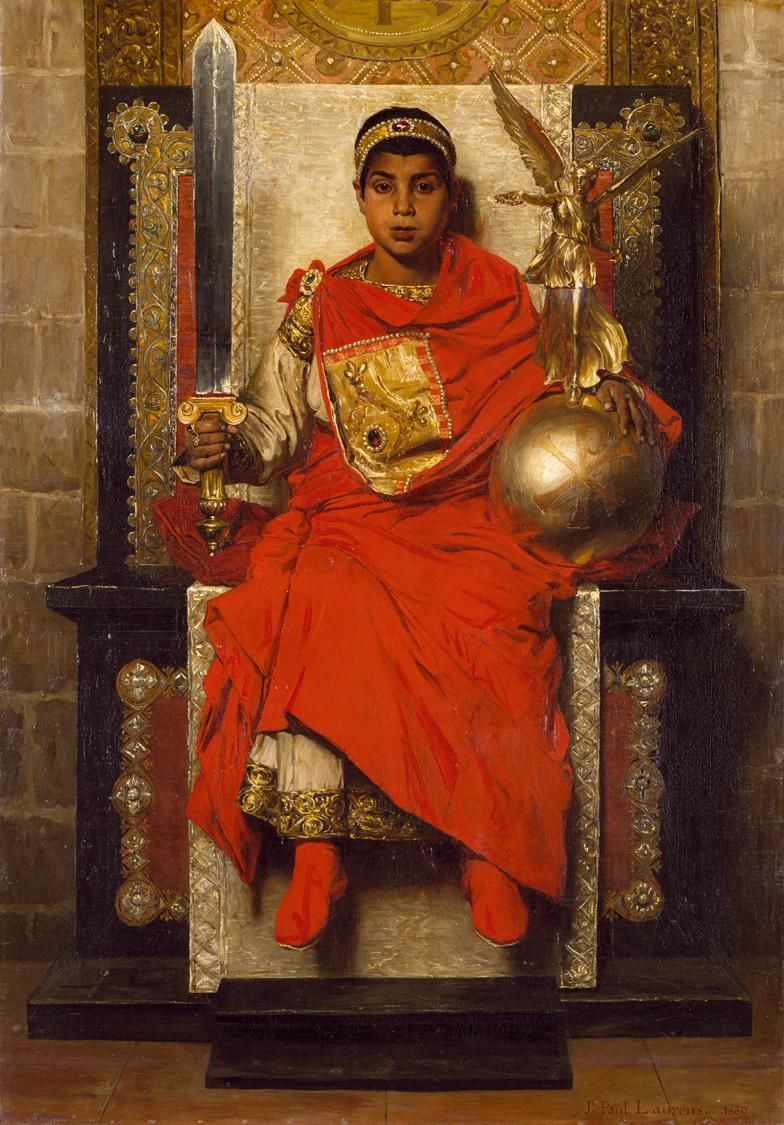HONORIUS CRUSHED RELIGIOUS RIVALS AND INTERVENED IN CHURCH AFFAIRS

[Above: Jean-Paul Laurens, The Byzantine Emperor Honorius (1880—Chrysler Museum of Art, Norfolk, USA / [public domain] Wikimedia]
EMPEROR HONORIUS of the Western Roman Empire is known for abolishing gladiatorial contests featuring human combatants. The impulse behind his edict was religious. Other edicts of his reign also addressed religious issues.
His father, Theodosius I, had made Trinitarian Christianity the only recognized form in the empire. Honorius took matters a step further. On this day, 2 March 396, he confiscated all buildings in which heretics assembled, and he interdicted their meetings.
Three years later, with his brother Arcadius, who ruled the Eastern Empire from Constantinople, he issued a declaration that rural pagan temples must be torn down “without disturbance.” In 415, Honorius and his nephew Theodosius II (who had succeeded Arcadius) required pagan priests in North Africa to return to their ancestral cities by mid-November. Their places of worship were awarded to the church. Pagan religious officials faced capital punishment if they led their traditional ceremonies.
Honorius also set precedent by meddling in the election of a bishop of Rome (later known as pope). During a contentious succession, he confirmed Eulalius, who seemed to have been properly elected by the norms of the day. He ordered Eulalius’s rival Boniface to step aside. However, Boniface provided evidence that Eulalius had blocked cathedral entrances to prevent Boniface’s adherents from taking part in the election. Honorius called a council of Italian bishops to settle the matter, but they deadlocked. Honorius then arranged a council of bishops from across the Western Empire. He ordered both Eulalius and Boniface to step aside until the matter could be settled, and sent a third bishop to conduct Easter services in Rome.
Eulalius showed up in Rome, however, falsely claiming he had imperial authority to preside over the Easter observance. Honorius immediately deposed Eulalius and confirmed his rival as Boniface I. The emperor rescinded his summons to outside bishops.
All this might make Honorius seem strong and decisive. Actually, he was timid and indolent. Just a ten-year-old boy when he inherited the Western Empire, he never seemed to grow to manhood. While Goths, Visigoths, Vandals, Franks, and other invaders—not to mention usurpers and forces from the Eastern Empire—gnawed at his kingdom, he let others fight for him. The last twenty-one years of his reign he holed up in Ravenna, one of the most defensible Italian fortress cities.
His first and most faithful minister was Stilicho, a cousin by marriage. Stilicho's energy and skill kept the empire intact. Fearing his ascendancy, Honorius eventually had him assassinated. Honorius's religion was not strong enough to hold him to his word, either: he promised a usurper named Constantine his life if he would surrender, but promptly killed him when he did.
Procopius, no admirer, claims Honorius scarcely batted an eye when he learned Alaric had taken Rome in 410. A eunuch, who cared for the royal poultry, announced to him that “Rome was destroyed.”
“And yet she just now ate out of my hands,” replied Honorius, referring to a favorite hen that he had nicknamed “Rome.”
“I mean,” said the eunuch, “that the city of Rome has been destroyed by Alaric.”
“But I,” said the emperor, “thought that my hen Rome was dead.”
Despite his weakness and inactivity, Honorius survived as emperor twenty-eight years—longer than all but two of his predecessors. When he died in 423, at age thirty-eight, he was succeeded by a usurper whom Theodosius II quickly vanquished. The empire, as history shows, never fully recovered from Honorius’s feeble rule. Unhappy heretics and pagans, whom he had divested of their religious property, were not inclined to support him against his rivals.
—Dan Graves
----- ----- -----
History of Christianity covers the growth of Christianity in its early years. Stream it at RedeemTV.
History of Christianity can also be purchased at VisionVideo.







